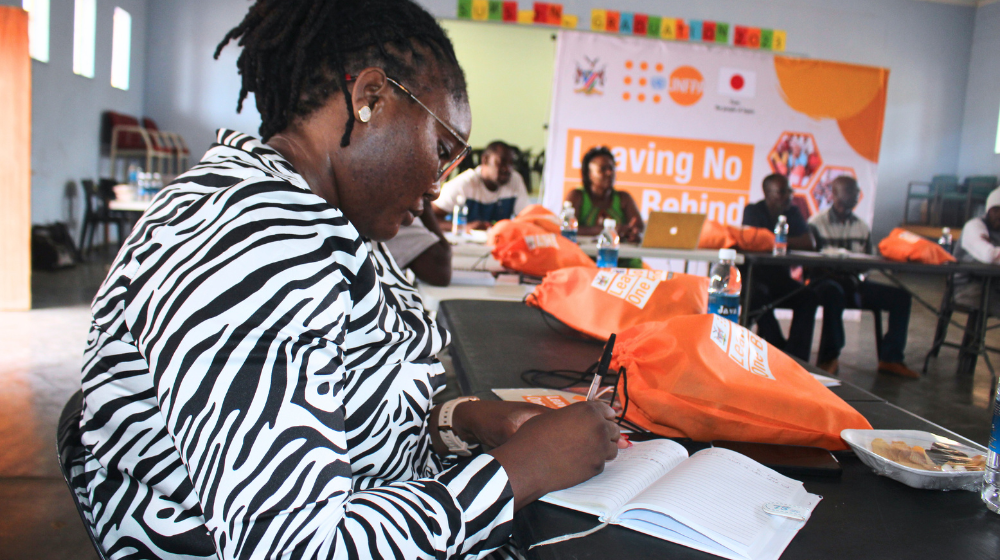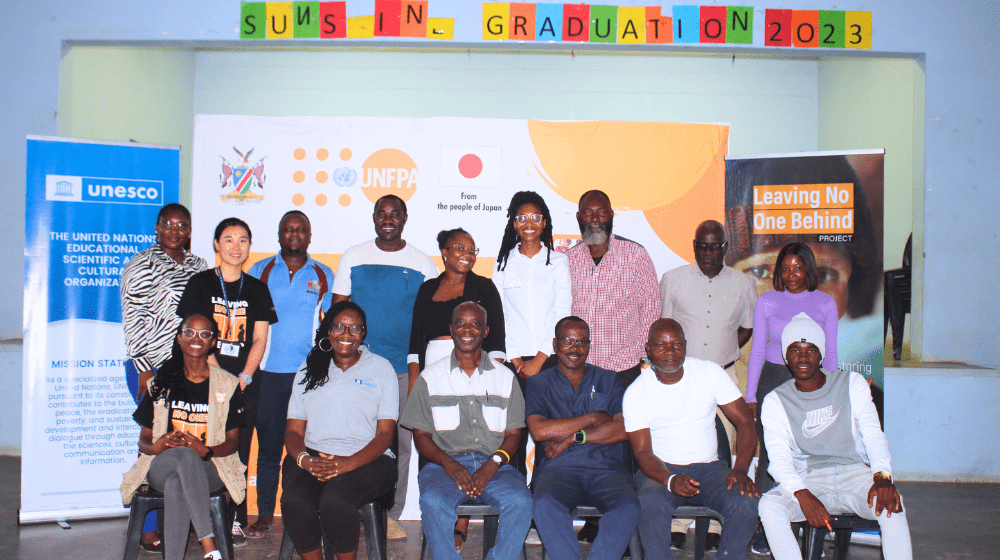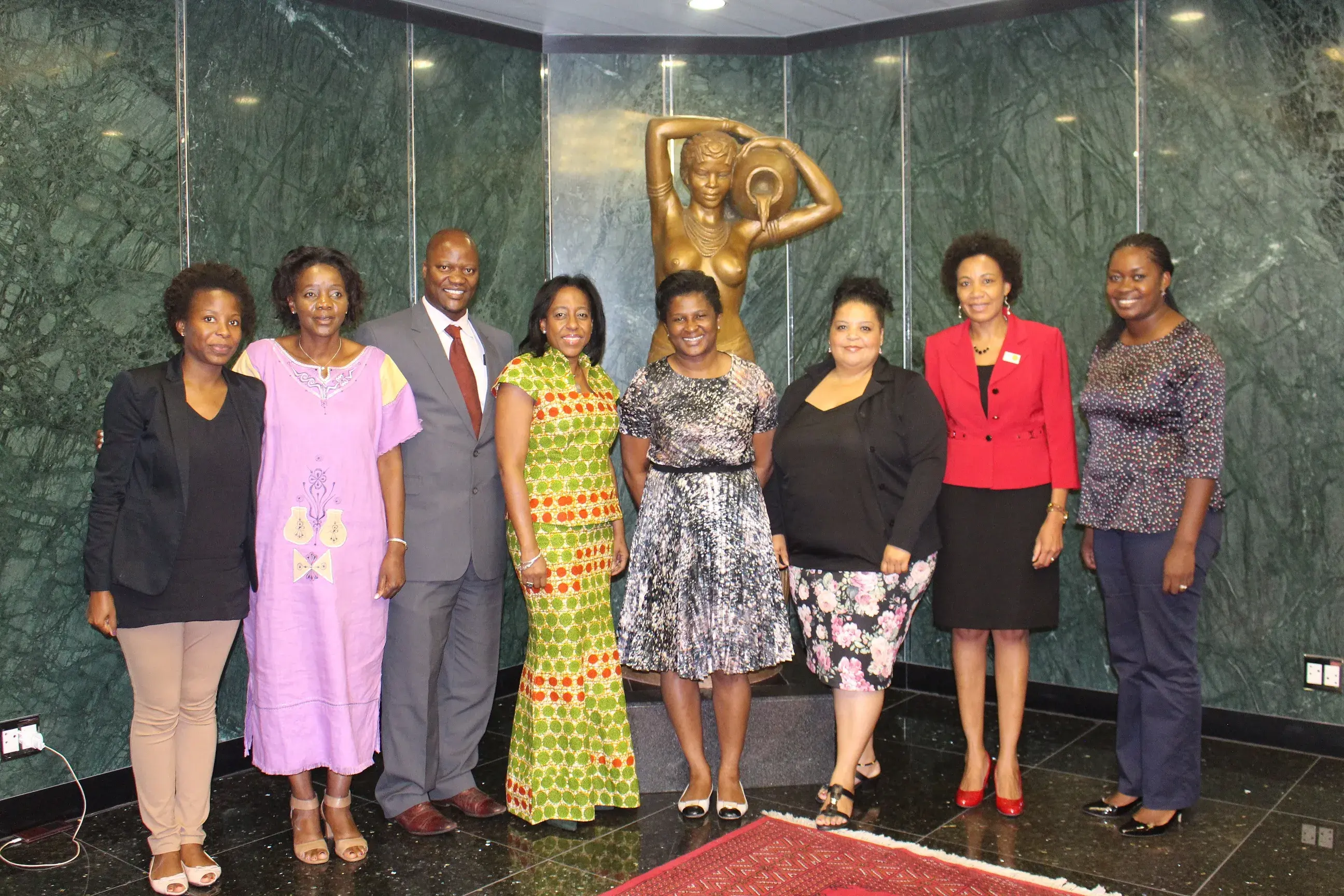
OPUWO, Namibia – “The radio reaches the community. They are dealing with the community every day. They are the ones who know their problems,” said Kunene Community Radio board member David Mbalundu, at a training hosted by the Leaving No One Behind (LNOB) project on 5 December 2023.
With invaluable support from the Japanese Government, the United Nations Population Fund (UNFPA) in collaboration with the United Nations Educational, Scientific and Cultural Organisation (UNESCO) held capacity building trainings during November and December for two community radio stations to help combat gender-based violence in Namibia.
Spreading awareness through the airways
This intervention enables Opuwo-based Kunene Community Radio (KCR) as well as Windhoek-based Focus FM to adequately report on, provide essential information as well as independently develop context-sensitive programmes that will educate communities on gender-based violence (GBV), sexual and reproductive health and rights (SRHR), and mental health and psychosocial support (MHPSS).
“I am a headman, so when I go back to my village, I have to share these messages with them. KCR, the Ministry of Health, we must all share the messages you have given us here today,” said Mbalundu.
Only if we all come together to spread the message will all the people hear.
“Only if we all come together to spread the message will all the people hear,” he added.
Radio's enduring influence in the social media age
In the age of social media, radio remains a powerful tool of communication in Namibia. According to a local newspaper, the country had 16 community radios and 18 commercial radio stations in 2021 with 98% of the population having access to radio.
As a widely accessible medium of engagement, the UNFPA-led Leaving No One Behind project collaborated with community radio stations in particular due to their people-centred interactive platforms that engage communities at the grassroots level on issues that they care about and that directly affect them.
“It is very important for us as media to have these skills because people trust us. If we can get accurate information and pass it on to our audience, it creates an environment where people are informed on current issues such as GBV and sexual health," said Focus FM Station Manager Emma Viljho at her station’s training workshop on 25 November 2023.
It is very crucial that we are informed and that we can give the public the right knowledge.
“It is very crucial that we are informed and that we can give the public the right knowledge”, added Viljho.
Tackling GBV through collaboration
For a country with alarming statistics that reveal that 33% of ever-married women aged 15-49 and 34% of young women aged 20-24 have experienced some form of violence in their lives including from their partner, interventions that address gender-based violence are much needed in Namibia, with all stakeholders from all sectors needing to play a role.
The training covered various topics such as media ethics, GBV/SRH/MHPSS content creation, legal frameworks governing GBV and health communication with presentations being conducted by UNFPA; UNESCO; the Ministry of Health and Social Services; the Ministry of Gender Equality, Poverty Eradication and Social Welfare; and the Ministry of Justice.
Participants were also tasked with practical exercises to test their newly acquired skills during the capacity-building training.
“We learned so much [during the training]. We delved deeply into issues of GBV, SRH and MHPSS, even learning some new terminologies today. All of what we have learned, we will share with our listeners. We are going to inform them because now we are more equipped with this information ourselves," said Viljho.
KCR board chairperson, Tjikunda Kulunga echoed this sentiment adding that this training was enriching for KCR as an institution that needs to share information and educate the community in Opuwo and its surrounding areas.
“We will use it to try and sensitise the community on GBV, as well as make them aware that there are institutions that can give them assistance," explained Kulunga.
"When it comes to education we are one"
Through the support of the Japanese Government via the Leaving No One Behind project, both Focus FM and KCR are now able to make a meaningful contribution in preventing and responding to GBV in Namibia, empowering communities with vital information that can save lives irrespective of their gender, religious, geographical, educational and cultural backgrounds.
“What we learned here is very important because what I know is not what you know. What I know in my culture, is not what you know in your culture. Culture is different but when it comes to education, we are one”, concluded Mbalundu.
The Leaving No One Behind project is fully funded by the People and Government of Japan with the project being implemented in seven regions. This project aims to address gender-based violence and negative sexual and reproductive health outcomes in Namibia. It is specifically dedicated to reaching those at risk of being left furthest behind, including vulnerable groups such as in- and out-of-school youth, pregnant and lactating women, women and girls facing multiple vulnerabilities, especially those with disabilities, refugees, and other groups at risk of sexual and gender-based violence.



